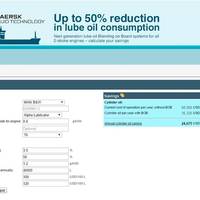Maersk Fluid Technology Sees SEA-Mate Order Influx

Maersk Fluid Technology (MFT) has reported a recent influx of orders for its SEA-Mate Blending-on-Board (BOB) system as confirmation of industry demand for technological solutions that enable ship operators to blend fit-for-purpose cylinder lubricant compositions on board their vessels that match actual engine operating conditions and fuel sulphur levels. The use of this type of technology can reduce cylinder oil consumption and alleviate issues such as cold corrosion and excessive cylinder wear, according to MFT.
Maersk Fluid Technology Upgrades SEA-Mate

Maersk Fluid Technology (MFT) said it has recently upgraded its SEA-Mate Blending-on-Board Value Calculator to include a mobile optimized version that will assist in calculating savings, based on a variety of real life scenarios. The SEA-Mate Blending-on-Board (BOB) system enables the crew on board the vessel to blend an engine-specific fit-for-purpose cylinder lubricant with the optimal neutralization and detergent properties. The in-use two-stroke engine system oil is blended with a high-BN cylinder oil.
Lukoil: Cylinder Oil to Reduce Wear, Consumption
Lukoil Marine Lubricants reports that it has expanded its sales in the 2012 business year by 74% to around $200m. Established in 2008, the subsidiary of Russian oil group Lukoil continues to grow rapidly. As for operative and technical expertise, since entering into the global lubricating oil business Lukoil has relied on its Hamburg site. “Here we are in close proximity to our customers, because Germany, and Hamburg in particular, remains one of the world’s most important shipping hubs. The combination of Russian raw materials, worldwide leading additive technology and German engineering has become a success factor for us.” To round off the connection to Hamburg, shipping line Hapag-Lloyd’s Hamburg Express also uses Lukoil products for lubrication.
Lukoil Develops Cylinder Oil Reducing Wear and Consumption
Maritime industry lubricant specialist Lukoil Marine Lubricants Ltd. reported that it expanded sales in the 2012 business year by 74% to around $200 million. Established in 2008, the subsidiary of Russian oil group Lukoil continues to grow rapidly. As for operative and technical expertise, since entering into the global lubricating oil business Lukoil has relied on its Hamburg site. “Here we are in close proximity to our customers, because Germany, and Hamburg in particular, remains one of the world’s most important shipping hubs. The combination of Russian raw materials, worldwide leading additive technology and German engineering has become a total success factor for us.” To round off the connection to Hamburg…
Propulsion: Optimizing Feed Rates For Crosshead Diesels
ExxonMobil introduced a program to optimize cylinder oil feed rates in low-speed (crosshead) diesel engines. The "Feed Rate Optimization" program is designed to help minimize operating expenses by analyzing scrapedown oil as a way to detect changes in the condition of an engine¹s cylinders. The program, which is designed to help customers find a balance between the cost of cylinder oil and the expense of wear-related cylinder maintenance, analyzes scrapedown oil collected from the engine’s scavenge space, a technique pioneered by ExxonMobil. It is designed to provide comprehensive laboratory testing and analysis of the oil sample, and offers onboard testing tools that enable ship’s engineers to quickly detect substantive changes in cylinder condition.
APL Aims to Cut Emissions
According to reports, cargo shipping line APL said it has begun using cleaner-burning fuels and will begin testing technology to reduce harmful emissions from its ships. APL, a unit of Singapore-based Neptune Orient Lines, said 23 of its ships that make regular stops at the ports of Los Angeles and Oakland now carry low-sulfur diesel fuel to run auxiliary engines, which generate power for the ship while it is docked. The move coincides with an approaching deadline for a new law that goes into effect Jan 1. It requires vessels to use cleaner-burning fuel while they near California ports or while berthed. Beginning in February, the ocean…
Wärtsilä Unveils New Cylinder Lubricating System
Wärtsilä Corporation has introduced a new, electronically-controlled cylinder lubricating system to meet the demand for lower cylinder oil feed rates: the Pulse Lubricating System (PLS). Developed for application in Wärtsilä RTA and RT-flex low-speed marine diesel engines, it delivers reduced cylinder oil consumption without compromising piston-running reliability. The Pulse Lubricating System makes it possible to reduce the cylinder oil feed rate compared with the existing accumulator system through an improved distribution of cylinder lubricating oil to the cylinder liner, and the fully flexible, precise timing of oil delivery.





